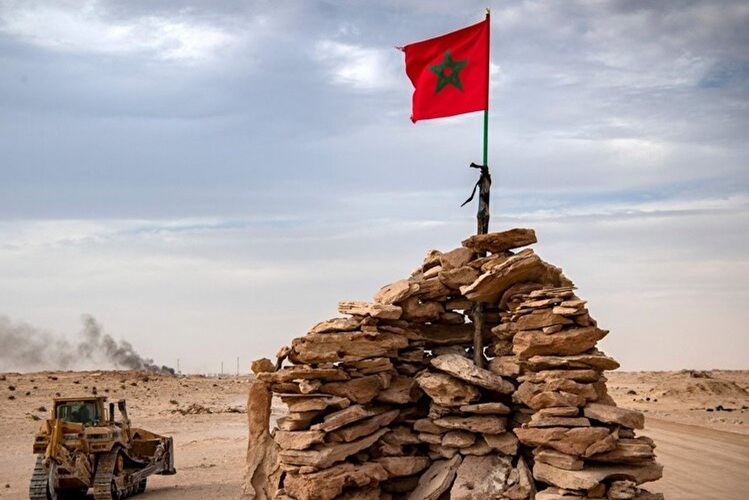US Trace in North African Conflict and Algeria's Anger at Morocco's Diplomatic Victory
TEHRAN (Defapress) - Despite strong opposition from Algeria, the United Nations Security Council adopted a resolution endorsing Morocco's plan for maintaining sovereignty over the disputed territory of Western Sahara. Russia and China abstained from voting on this resolution. Proposed by the United States, this resolution is considered the most significant diplomatic achievement for Morocco and is supported by a majority of European Union member states and several of its African allies.

The resolution's text presents the Moroccan plan as a basis for negotiation. Similar to resolutions in previous years, it makes no mention of holding a referendum for self-determination and independence, a solution that the Polisario Front and its allies, including Algeria, Russia, and China, have emphasized for years.
Western Sahara, the Sea of Phosphate
The Polisario Front is a military and political organization resisting the Moroccan government in Western Sahara. The Polisario operates from refugee camps in southwestern Algeria and considers itself the representative of the indigenous Sahrawi people.
Western Sahara is a coastal region rich in phosphate mines, roughly the size of the US state of Colorado, which was under Spanish colonial rule until 1975. The United States, the main proponent of this resolution, managed to secure the support of 11 countries. Russia, China, and Pakistan abstained, while Algeria, the primary backer of the Polisario Front, opposed it.
US Ambassador to the UN, Linda Thomas-Greenfield, described the vote as historic, stating, "This action will strengthen a peace process that has long been stalled."
In contrast, Amar Bendjama, Algeria's Ambassador to the UN, said, "Although this resolution is improved compared to previous versions, it still has significant shortcomings and falls below the expectations and legitimate aspirations of the people of Western Sahara, who are represented by the Polisario Front."
The text of the resolution states, "Genuine autonomy under Moroccan sovereignty could be the most practical solution." The resolution also extends the mandate of the UN peacekeeping mission in Western Sahara for another year, a mission that has continued for over 3 decades.
Development of Western Sahara's Infrastructure
The UN has called on all involved parties to use this unprecedented opportunity to achieve a lasting peace. It has also requested the UN Secretary-General to review the peacekeeping mission's mandate within the next 6 months.
This shift in position could transform a process that has been deadlocked for decades. Just this week, protests were held in Sahrawi refugee camps in Algeria, with people declaring they will not give up the struggle for the right to self-determination.
Morocco exercises almost complete control over Western Sahara, except for a narrow strip east of the Moroccan-built wall, known as the "Free Zone."
A 1991 ceasefire was intended to pave the way for a self-determination referendum, but disagreements over voter eligibility prevented its implementation.
In recent years, Morocco has built extensive infrastructure in the region, including a deep-water port and a 1,055-kilometer highway. Government subsidies have reduced the prices of food and energy, and the region's population has grown with the migration of Moroccans to cities like Dakhla and Laayoune.
The Polisario Front's Stance
The Polisario Front withdrew from the ceasefire in 2020 following clashes near a road Morocco was constructing towards Mauritania. Since then, the group has regularly reported on military engagements, while Morocco has often denied the occurrence of such clashes.
In response to the draft resolution, the Polisario Front announced it would not participate in any process aimed at legitimizing Morocco's illegal military occupation, emphasizing that peace is not achieved by rewarding expansionism.
This conflict is a central focus of North African diplomacy. Morocco considers support for its autonomy plan a benchmark for measuring the loyalty of its allies. Following the adoption of the resolution, King Mohammed VI of Morocco stated, "This action opens a new, triumphant chapter in the process of consolidating the Moroccan identity of the Sahara; a chapter aimed at definitively closing this file."
Last October, the UN Special Envoy, Staffan de Mistura, proposed a partition of Western Sahara, which was not accepted by either side. He asked Morocco to clarify the details of its autonomy plan and warned that a lack of progress could call the UN's role into question.
The effort to review the UN mission in Western Sahara comes as the United States has cut funding for many UN programs and institutions, including peacekeeping missions.
US officials have adopted a selective approach to funding; they support only those entities that align with their agenda and set others aside. They describe the UN budget as "large and inefficient" and have promised not to provide any new funding until each institution and program is thoroughly reviewed.
The Possibility of Military Conflict and Iran's Position
The possibility of military conflict between Morocco and Algeria exists, but currently, the dispute remains largely at the level of diplomatic tensions and defense preparations.
In recent months, Algeria passed a new law for general mobilization, allowing the government to swiftly transition from a state of peace to a state of war in the face of a military or security threat. Analysts view this move as a sign of potential readiness to confront Morocco.
A joint military exercise between France and Morocco in the Errachidia region, conducted near the Algerian border, prompted a strong reaction from Algeria, which described it as "provocative." Algeria's Foreign Ministry summoned the French ambassador and warned about the implied messages of this exercise.
Relations between the two countries have been tense for decades, with disputes over Western Sahara, Algeria's support for the Polisario Front, and Morocco's closeness to Israel being the primary factors escalating tensions. In 2021, Algeria formally severed diplomatic relations with Morocco.
The official stance of the Islamic Republic of Iran regarding the Western Sahara conflict is not direct support for the Polisario Front. However, Iran has traditionally supported the right to self-determination for the Sahrawi people and is not aligned with Moroccan expansionism.
